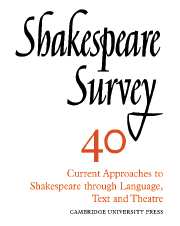Book contents
- Frontmatter
- Reconstructing Shakespeare, or Harlotry in Bardolatry
- Playing Shakespeare
- Take me to your Leda
- Sign Theory and Shakespeare
- Time in Richard III
- New Concepts of Staging A Midsummer Night’s Dream
- Henry V as Working-House of Ideology
- Shakespeare and his Sources: Observations on the Critical History of Julius Caesar
- The Speculative Eye: Problematic Self-Knowledge in Julius Caesar
- Learning by Talking: Conversation in As You Like It
- Measure for Measure: Mirror for Mirror
- Allegory and Irony in Othello
- Cruelty, King Lear and the South African Land Act 1913
- The Rationale of Current Bibliographical Methods: Printing House Studies, Computer-Aided Compositor Studies, and the Use of Statistical Methods
- Shakespeare’s Late Plays at Stratford, Ontario
- Shakespeare Performances in London, Manchester and Stratford-upon-Avon 1985–6
- The Year's Contributions to Shakespearian Study 1 Critical Studies
- 2 Shakespeare’s Life, Times, and Stage
- 3 Editions and Textual Studies
- Index
Shakespeare’s Late Plays at Stratford, Ontario
Published online by Cambridge University Press: 28 March 2007
- Frontmatter
- Reconstructing Shakespeare, or Harlotry in Bardolatry
- Playing Shakespeare
- Take me to your Leda
- Sign Theory and Shakespeare
- Time in Richard III
- New Concepts of Staging A Midsummer Night’s Dream
- Henry V as Working-House of Ideology
- Shakespeare and his Sources: Observations on the Critical History of Julius Caesar
- The Speculative Eye: Problematic Self-Knowledge in Julius Caesar
- Learning by Talking: Conversation in As You Like It
- Measure for Measure: Mirror for Mirror
- Allegory and Irony in Othello
- Cruelty, King Lear and the South African Land Act 1913
- The Rationale of Current Bibliographical Methods: Printing House Studies, Computer-Aided Compositor Studies, and the Use of Statistical Methods
- Shakespeare’s Late Plays at Stratford, Ontario
- Shakespeare Performances in London, Manchester and Stratford-upon-Avon 1985–6
- The Year's Contributions to Shakespearian Study 1 Critical Studies
- 2 Shakespeare’s Life, Times, and Stage
- 3 Editions and Textual Studies
- Index
Summary
John Hirsch, Artistic Director of the Shakespeare Festival at Stratford, Ontario from 1981 to 1985, had hoped to stage all four of Shakespeare’s late plays in a single season but felt unable to run the financial risks, and it was left to his successor, John Neville, to take the plunge and base the 1986 season on three of them: Pericles, Cymbeline, and The Winter’s Tale. It is a pity that Mr Hirsch could not realize his ambition, for his 1982 production of The Tempest there was the only coherent version of the play I have seen, and whatever the virtues of Mr Neville’s season, coherence was not among them. He aimed instead at diversity within unity, engaging three different directors. Each avoided a generalized fairy-tale setting, and located the action within a specific period, but of widely different kinds: Pericles was set in the eighth century Byzantine empire, Cymbeline in the late 1930s, The Winter’s Tale in the nineteenth century.
- Type
- Chapter
- Information
- Shakespeare Survey , pp. 155 - 168Publisher: Cambridge University PressPrint publication year: 1988

